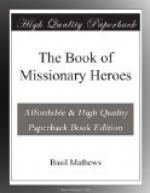So Miss Cushman gathered the six hundred Armenian children together into an orphanage, that was half for the boys and half for the girls. She was a hundred times better than the “Woman who Lived in a Shoe,” because, though she had so many children, she did know what to do. She taught them to make nearly everything for themselves. In the mornings you would see half the boys figuring away at their sums or learning to write and read, while the other boys were hammering and sawing and planing at the carpenter’s bench; cutting leather and sewing it to make shoes for the other boys and girls; cutting petrol tins up into sheets to solder into kettles and saucepans; and cutting and stitching cloth to make clothes. A young American Red Cross officer who went to see them wrote home, “The kids look happy and healthy and as clean as a whistle.”
The People on the Plain
As Miss Cushman looked out again from the hospital window she saw men coming from the country into the city jogging along on little donkeys.
“In the villages all across the plain,” they said to her, “are Armenian boys and girls, and men and women. They are starving. Many are without homes, wandering about in rags till they simply lie down on the ground, worn out, and die.”
Miss Cushman sent word to friends far away in America, and they sent food from America to Turkey in ships, and a million dollars of money to help the starving children. So Miss Cushman got together her boys and girls and some other helpers, and soon they were very busy all day and every day wrapping food and clothes into parcels.
Next a caravan of snorting camels came swinging in to the courtyard and, grumbling and rumbling, knelt down, to be loaded up. The parcels were done up in big bales and strapped on to the camels’ backs. Then at a word from the driver the camels rose from their knees and went lurching out from Konia into the country, over the rough, rolling tracks, to carry to the people the food and clothes that would keep them alive.
The wonderful thing is that these camels were led by a Turk belonging to the people who hate the Armenians, yet he was carrying food and clothes to them! Why did this Turk in Konia go on countless journeys, travelling over thousands of miles with tens of thousands of parcels containing wheat for bread and new shirts and skirts and other clothes for the Armenians whom he had always hated, and never lose a single parcel?
Why did he do it?
This is the reason. Before the war when he was ill in the hospital Miss Cushman had nursed him with the help of her Armenian girls, and had made him better; he was so thankful that he would just run to do anything that she wished him to do.
To Stay or not to Stay?
But at last Miss Cushman—worn out with all this work—fell ill with a terrible fever. For some time it was not certain that she would not die of it; for a whole month she lay sick in great weakness. President Wilson had at this time broken off relations between America and Turkey. The Turk now thought of the American as an enemy; and Miss Cushman was an American. She was in peril. What was she to do?




